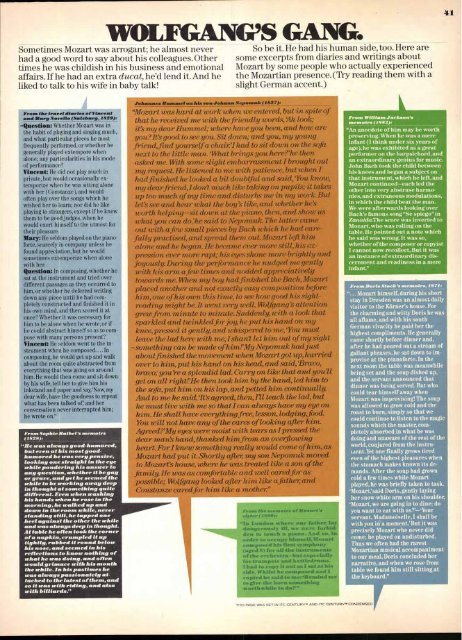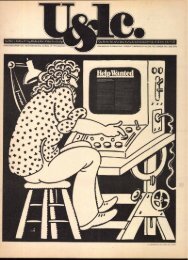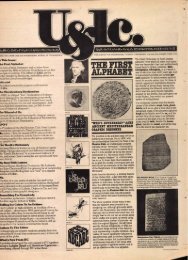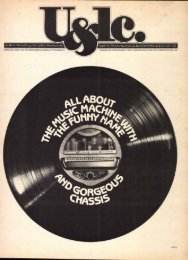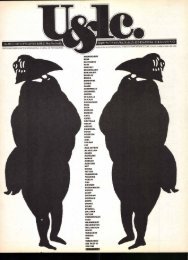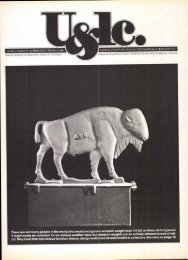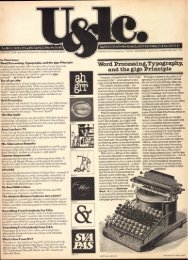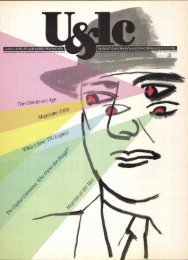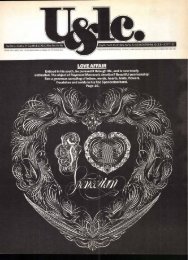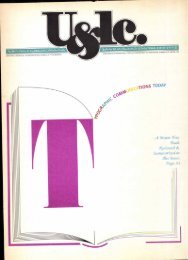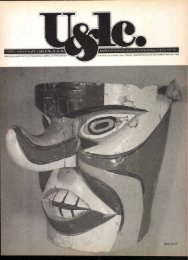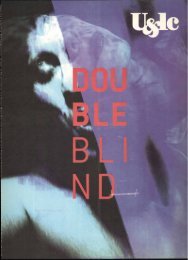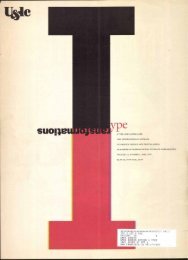Volume 9–2 (Low Res).pdf
Volume 9–2 (Low Res).pdf
Volume 9–2 (Low Res).pdf
You also want an ePaper? Increase the reach of your titles
YUMPU automatically turns print PDFs into web optimized ePapers that Google loves.
WOLFGANG'S GANG.<br />
Sometimes Mozart was arrogant; he almost never<br />
had a good word to say about his colleagues. Other<br />
times he was childish in his business and emotional<br />
affairs. If he had an extra ducat, he'd lend it. And he<br />
liked to talk to his wife in baby talk!<br />
From the travel diaries of Vincent<br />
and Mary Novella (Salzburg, 1829):<br />
“Question: Whether Mozart was in<br />
the habit of playing and singing much,<br />
and what particular pieces he most<br />
frequently performed, or whether he<br />
generally played extempore when<br />
alone; any particularities in his mode<br />
of performance?<br />
Vincent He did not play much in<br />
private, but would occasionally extemporize<br />
when he was sitting alone<br />
with her (Constanze), and would<br />
often play over the songs which he<br />
wished her to learn; nor did he like<br />
playing to strangers, except if he knew<br />
them to be good judges, when he<br />
would exert himself to the utmost for<br />
their pleasure.<br />
Mary: He seldom played on the pianoforte,<br />
scarcely in company unless he<br />
found appreciation, but he would<br />
sometimes extemporize when alone<br />
with her.<br />
Question: In composing, whether he<br />
sat at the instrument and tried over<br />
different passages as they occurred to<br />
him, or whether he deferred writing<br />
down any piece until he had completely<br />
constructed and finished it in<br />
his own mind, and then scored it at<br />
once? Whether it was necessary for<br />
him to be alone when he wrote, or if<br />
he could abstract himself so as to compose<br />
with many persons present?<br />
Vincent: He seldom went to the instrument<br />
when he composed.... In<br />
composing, he would get up and walk<br />
about the room quite abstracted from<br />
everything that was going on around<br />
him. He would then come and sit down<br />
by his wife, tell her to give him his<br />
inkstand and paper and say, 'Now, my<br />
dear wife, have the goodness to repeat<br />
what has been talked of,' and her<br />
conversation never interrupted him;<br />
he wrote on."<br />
"Ile was always good-humored,<br />
but even at his most goodhumored<br />
he was very pensive,<br />
looking one straight in the eye<br />
while pondering his answer to<br />
any question, whether it be gay<br />
or grave, and yet he seemed the<br />
while to be working away deep<br />
in thought at something quite<br />
different. Even when washing<br />
his hands when he rose in the<br />
morning, he walked up and<br />
down in the room while, never<br />
standing still, he tapped one<br />
heel against the other the while<br />
and was always deep in thought.<br />
At table he often took the corner<br />
of a napkin, crumpled it up<br />
tightly, rubbed it round below<br />
his nose, and seemed in his<br />
reflections to know nothing of<br />
what he was doing, and often<br />
would grimace with his mouth<br />
the while. In his pastimes he<br />
was always passionately attached<br />
to the latest of them, and<br />
so it was with riding, and also<br />
with billiards."<br />
So be it. He had his human side, too. Here are<br />
some excerpts from diaries and writings about<br />
Mozart by some people who actually experienced<br />
the Mozartian presence.(Try reading them with a<br />
slight German accent.)<br />
Johannes Hummel on his son Johann Nepomuk (1837):<br />
'Mozart was hard at work when we entered, but in spite of<br />
that he received me with the friendly words, Ah look;<br />
it's my dear Hummel; where have you been, and how are<br />
you? ft's good to see you. Sit down; and you, my young<br />
friend, find yourself a chair'I had to sit down on the sofa<br />
next to the little man. 'What brings you here?'he then<br />
asked me. With some slight embarrassment I brought out<br />
my request. He listened to me with patience, but when I<br />
had finished he looked a bit doubtful and said, `You know,<br />
my dear friend, I don't much like taking on pupils; it takes<br />
up too much of my time and disturbs me in my work. But<br />
let's see and hear what the boy's like, and whether he's<br />
worth helping—sit down at the piano, then, and show<br />
what you can do,'he said to Nepomuk. The latter came<br />
out with a few small pieces by Bach which he had car<br />
fully practised, and spread them out. Mozart left hi<br />
alone and he began. He became ever more still, his ex-<br />
pression ever more rapt; his eyes shone more brightly and<br />
joyously. During the performance he nudged me gently<br />
with his arm a few times and nodded appreciatively<br />
towards me. When my boy had finished the Bach, Moza<br />
placed another and not exactly easy composition befo<br />
him, one of his own this time, to see how good his sightreading<br />
might be. It went very well. Wolfgang's attention<br />
grew from minute to minute. Suddenly, with a look that<br />
sparkled and twinkled for joy, he put his hand on my<br />
knee, pressed it gently, and whispered to me, `You must<br />
leave the lad here with me, I shan't let him out of my sight<br />
—something can be made of him!' My Nepomuk had just<br />
aboutfinished the movement when Mozart got up, hurrie<br />
over to him, put his hand on his head, and said, `Bravo,<br />
bravo; you're a splendid lad. Carry on like that and you'll<br />
get on all right!'He then took him by the hand, led him to<br />
the sofa, put him on his lap, and petted him continuall<br />
And to me he said, 'It's agreed, then, I'll teach the lad, bu<br />
he must live with me so that I can always have my eye o<br />
him. He shall have everything free, lesson, lodging ,food<br />
You will not have any of the cares of looking after him.<br />
Agreed?'My eyes were moist with tears as I pressed the<br />
dear man's hand, thanked him from an overflowing<br />
heart. For I knew something really would come of him, as<br />
Mozart had put it. Shortly after, my son Nepomuk moved<br />
to Mozart's house, where he was treated like a son of the<br />
,family. He was as comfortable and well cared for as<br />
possible; Wolfgang looked after him like a father, and<br />
m like a. r"<br />
z is ter (1800):<br />
In London w here our father<br />
dangerously ill, we were fort<br />
den to touch a piano. And so ,<br />
order to occupy himself, Moza<br />
composed his first symphony.<br />
(aged 8) for all the instrumen<br />
of the orchestra-but especi<br />
for trumpets and kettledrums<br />
had to copy it out as I sat at h<br />
side. Whilst he composed an<br />
copied he said to me: lie<br />
to give the horn something<br />
THIS PAGE WAS SET IN ITC CENTURY'. AND ITC CENTURY" CONDENSED<br />
From William Jackson's<br />
memoirs (1882):<br />
"An anecdote of him may be worth<br />
preserving. When he was a mere<br />
infant (I think under six years of<br />
age), he was exhibited as a great<br />
performer on the harpsichord, and<br />
an extraordinary genius for music.<br />
John Bach took the child between<br />
his knees and began a subject on<br />
that instrument, which he left, and<br />
Mozart continued—each led the<br />
other into very abstruse harmonies,<br />
and extraneous modulations,<br />
in which the child beat the man.<br />
We were afterwards looking over<br />
Bach's famous song "Se spiego" in<br />
Zanaida.The score was inverted to<br />
Mozart, who was rolling on the<br />
table. He pointed out a note which<br />
he said was wrong. It was so,<br />
whether of the composer or copyist<br />
I cannot now recollect, But it was<br />
an instance of extraordinary discernment<br />
and readiness in a mere<br />
infant."<br />
From Doris Stock's memoirs, 1871:<br />
"...Mozart himself, during his short<br />
stay in Dresden was an almost daily<br />
visitor to the Korner's house. For<br />
the charming and witty Doris he was<br />
all aflame, and with his south<br />
German vivacity he paid her the<br />
highest compliments. He generally<br />
came shortly before dinner and,<br />
after he had poured out a stream of<br />
gallant phrases, he sat down to improvise<br />
at the pianoforte. In the<br />
next room the table was meanwhile<br />
being set and the soup dished up,<br />
and the servant announced that<br />
dinner was being served. But who<br />
could tear himself away when<br />
Mozart was improvising! The soup<br />
was allowed to grow cold and the<br />
roast to burn, simply so that we<br />
could continue to listen to the magic<br />
sounds which the master, completely<br />
absorbed in what he was<br />
doing and unaware of the rest of the<br />
world, conjured from the instruident.Yet<br />
one finally grows tired<br />
even of the highest pleasures when<br />
the stomach makes known its demands.<br />
After the soup had grown<br />
cold a few times while Mozart<br />
played, he was briefly taken to task.<br />
'Mozart; said Doris, gently laying<br />
her snow-white arm on his shoulder,<br />
'Mozart, we are going in to dine; do<br />
you want to eat with us?'— 'Your<br />
servant, Madamoiselle, I shall be<br />
with you in a moment.'But it was<br />
precisely Mozart who never did<br />
come; he played on undisturbed.<br />
Thus we often had the rarest<br />
Mozartian musical accompaniment<br />
to our meal, Doris concluded her<br />
narrative, and when we rose from<br />
table we found him still sitting at<br />
the keyboard."<br />
41


